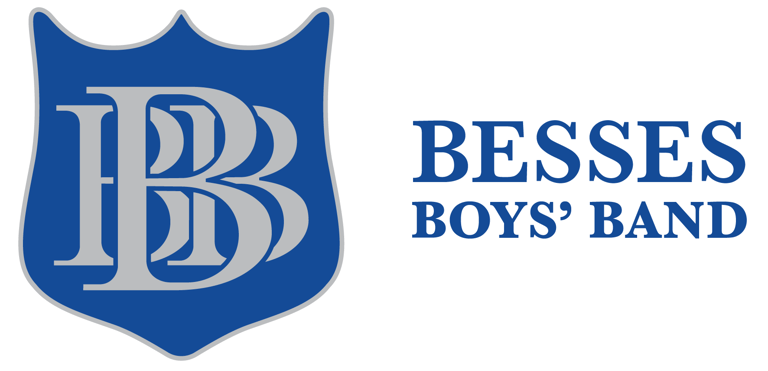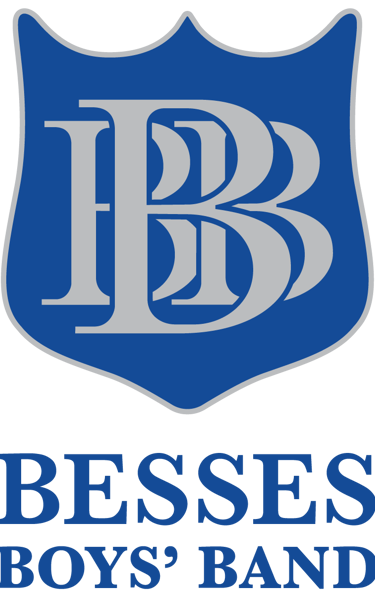Our Story
The band was conceived in the grim days of the Second World War, born in adversity before spirits were raised by the Normandy Landings. The band was formed by two members of the Besses o'th Barn Band, Fred Cowburn and Nathan Snape. The war had decimated the band and officials believed that the way for it to survive was to train young people in musicianship. Thirteen of the senior band's players had been lost in the first sixth months of the 1939/45 conflict and in the Moss Lane band room there was fears of a bleak future.
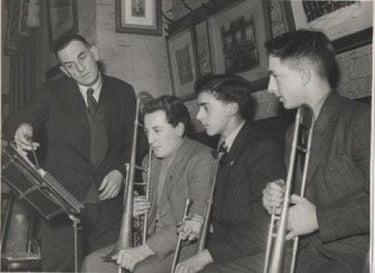

A 'nursery class' was formed with four lads, Jim Cowburn, Rowland Curless, Harold Galloway and Stan Warburton. The band grew quickly and was recognized as Besses Boys' Band on October 11th that year by the Alex Owen Brass Band Festival Committee. The boys played braved the winter weather and public scrutiny in 1943 and played Christmas carols in Whitefield Streets for a collection that raised just over £6.00.
Proficiency in music making developed fast and Jim Wright, who had conducted the senior band on occasions before the war, was brought in as conductor. Enthusiasm and support was growing too.
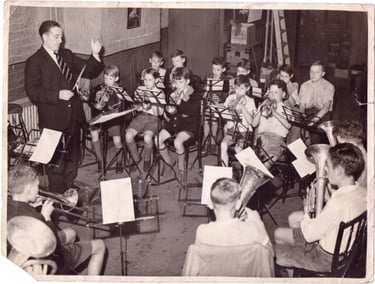

ARP Wardens donated berets as part of the uniform. Instruments and scores and sets of music were given to the band by the Bristol Aeroplane Co. Band, based at Accrington. And Whitefield residents contributed clothing ration coupons plus more that £1,000 for uniforms and equipment.The first public engagement was in July, 1944. The band went from strength to strength and was soon at a standard to enter and compete in national contest which led to a phenomenal run of contest success. From 1945 Besses Boys’ Band won the British Junior Championship three years in a row. They were barred in 1948 after their ‘hat trick’ and they returned to Belle Vue for two more victories before the contest ended winning five times in six years.
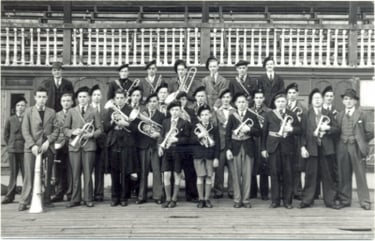

Returning from successes at Belle Vue, the Boys’ coach had first to call at the Squirrel Café in Deansgate, Manchester, for a nutritious reward from Mr. G. E. Troughear, one of the directors. Cheering crowds met the boys at Besses Junction, where the learners’ band turned out to play musical congratulations. And the lads celebrated with potato pie suppers provided in Besses Mission by Mrs. Tim Galloway.
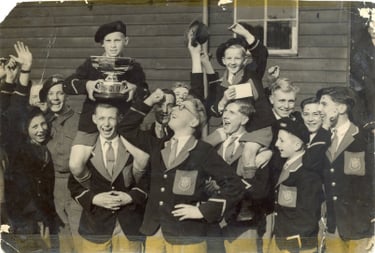

1950
The death of Mr Wright (Conductor) before the 1950 junior championship was a traumatic experience for the boys. But directed by William Haydock, they went on to win the title again.Contest victories brought concert engagements over a wide area. The boys were given warm receptions and often return home in continuing days of food rationing with “parcels of red flannel” (boiled ham) and an egg.
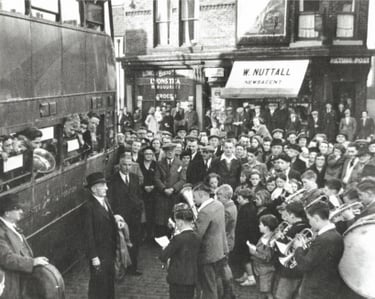

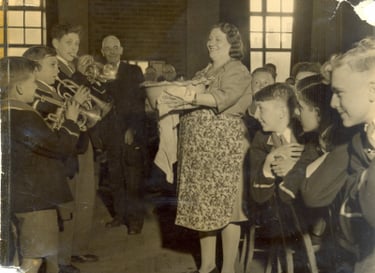

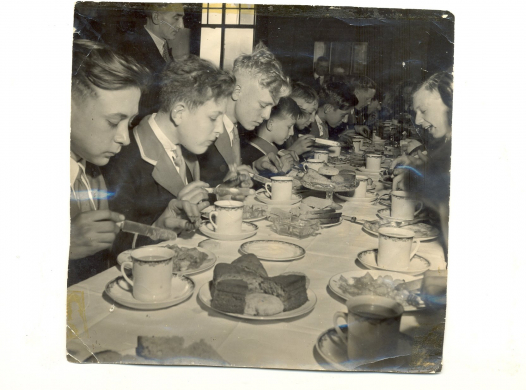

They played under Harry Mortimer, Charles Groves, John Hopkins and Alex Mortimer. The band also appeared in shows with Richard Murdoch, Tommy Handley and Jack Train.
There were also regular bookings for radio broadcasts. Whitesuntide became a marathon each year. The band played three times a day almost every day of that weak. By this time many of the older boys had moved to the senior band or rival groups and the boys' fortunes fluctuated during periods of rebuilding. But the 'Peter Pan' band continued, unlike so many other youth bands which changed name and identity as their players grew older. The boys continued to play many concerts including charity shows. The solo contest had become an annual event and Christmas and New Year playing in the streets continued and there was also a TV appearance in 1958.The band was guided through these times by the enthusiastic encouragement of Pat Edgar and the famous Willie Wood, who between them ensured that Besses Boys’ Band remained the longest surviving youth band in the world.
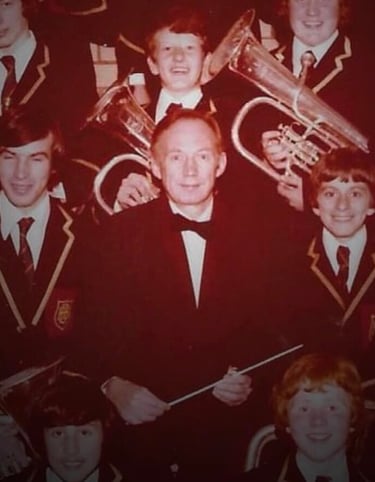

1960
Willie Wood, a professional musician who had directed the senior band became conductor in 1960, directing the boys with discipline and the experience of a lifetime in professional and amateur music making. At this time the boys produced a "78" record under his baton and in 1970, ten years later Pat Edgar a stalwart from the early days took over. He had joined the boys within a year of its formation and played soprano in the senior band for almost 28 years. Pat developed a busy concert diary and conducted the first of the bands successful spring concerts in Radcliffe. Many boys continued to graduate to the senior band and the band was twice successful in auditions for Opportunity Knocks
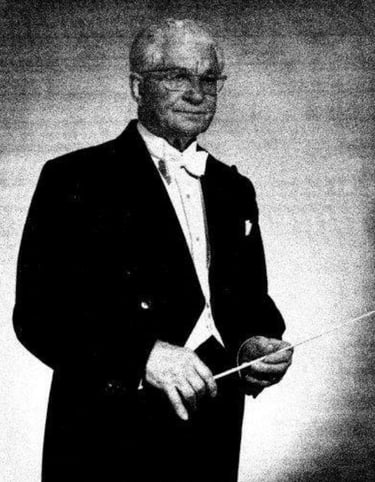

1970 + 1980
Barrie Chappell, who formerly played tenor horn with the senior band, took over from Pat Edgar and was appointed musical director in 1978. For 13 years Barrie, ably assisted by training band tutor Derek McCulloch, Continued rebuilding the boys' band which had remarkable run of success, both in the concert and contest fields. Barrie’s rare blend of patience, expertise and ambition paid off handsomely in concert performances and It was during these times the band was ‘placed’ over 100 times, 60 of these being first place awards and also including a record of seven consecutive years being the North West Youth Champions of Great Britain.
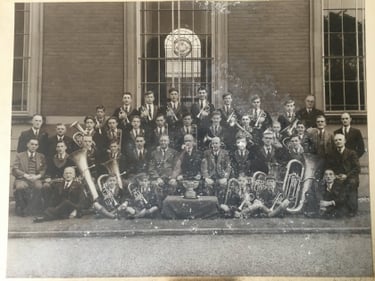

The band of 1986/87 was perhaps one of the most noteworthy in the bands history. November of 1985 saw the loss of 15 players from the band and their replacement by younger less experienced players from the training band – Almost immediately the band clicked and musical director Barrie Chappell realized that this was “special” and he decided to enter the band in the fourth section contests. The first was in May, 1986 in Leeds when the band took third place behind a field of over 20 bands. They had earlier in the year won for the Sixth time in a row, the N.W area youth contest. They went on, in October of that year, to come second in the National Youth Finals, being beaten by only one point, by The West Glamorgan Youth Band, who were a county youth band. The test piece was Edward Gregson’s “Occasion” and the band went on to use this test piece at the Tyldesley and Wigan contests to win on both “Occasions” with superlative comments from adjudicator, Kevin Bolton
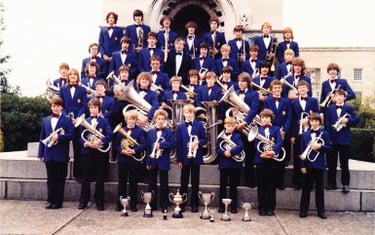

March of 1987 saw the band prepare in a period of only two weeks, the test piece “Facets of Glass” which turned out to be the winning performance at Oldham contest. The only disappointment was the failure at Blackpool later that year in March 1987, to win the youth section area contest but they went on the same day to win the Adult 4th Section area contest.
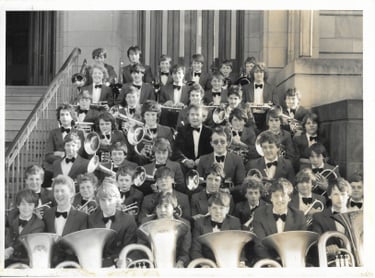

The band were North West youth champions for 12 years, playing at such venues as the Royal Albert Hall in London finals and chalking up high placing each year. The best youth final positions were second in 1982 and 1986. Another national title was clinched at last in 1987, "the year the band fell between two stools" at the area qualifying contest. They were shocked to fail for the first time in the North West youth competition, but showed character and ability later the same year in the Westminster Hall that October when the Besses Boys’ Band performance of “ A little suite for Brass” by Kenneth Platts on 3rd October, ensured for them a true accolade, the Fourth Section Championship of 1987.
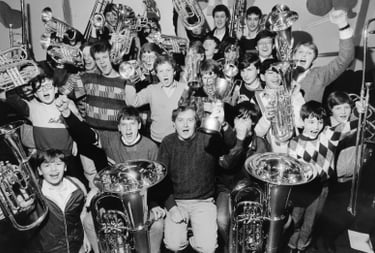

After the bands remarkable success invitations to European youth contests followed along with promotion in the adult grades to section two even before the introduction of the first section.
Concert work, the bands financial lifeblood was never neglected and a series of engagements were played with conductors like Jim Shepherd, Ifor James, Dereck Southcott, Roy Newsome and Gordon Higginbottom. In fact Roy served as president for a time and wrote "The three B's march" for a concert to commemorate the band's 40th anniversary. Harry Mortimer was the guest conductor and Brian Mather, an old boy who served 15 years as top cornet with the senior band, was guest soloist. Later Alan Stringer, principal trumpet with the Royal Liverpool Philharmonic Orchestra, was another old boy featured as guest soloist. He was just one of several players who became professional musicians. Mark Wilkinson was among a stream of boys who joined the National Youth Brass Band of Great Britain. He was principal cornet when the NYBB played a 1989 BBC proms concert.
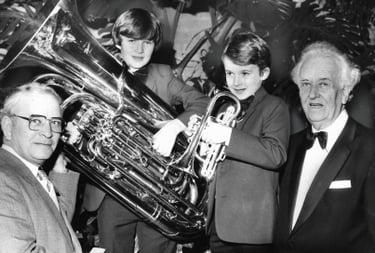

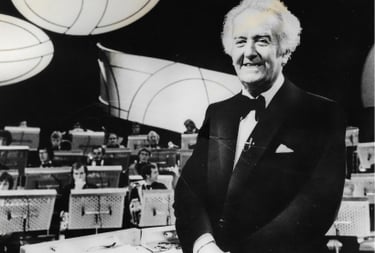

Further highlights under Barrie Chappell's leadership were two LP recordings, an appearance with Roy Castle in the BBC TV Brass Beat Series and a tour of Australia in 1988. The band were invited to perform at the World Festival of Bands in Brisbane Australia, which included a prestigious involvement in the opening ceremony for ‘British Day’ at the World Expo, supporting the then Prime Minister Margaret Thatcher, who acknowledged the band and complimented the band on their playing for the occasion.
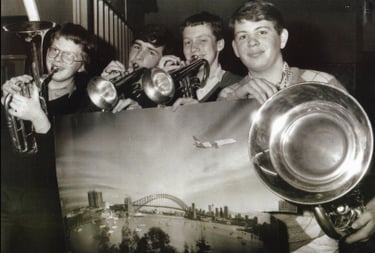

The band worked very hard prior to the Australian Tour to raise the money required to finance this ambitious project. After many concerts, jumble sales, coffee evenings and the like, each member had to pay an amount towards the trip, this unfortunately proved to be an impossible burden for some families with more than one son in the band, and the tour was almost cancelled. The day was saved by a kind benefactor, who, on hearing of the problem made a donation to the band to relive the financial burden being experienced.
During the visit to Australia the band embarked on a week’s trip on a ‘sleeper train’ travelling up the Gold Coast, sharing the adventure with the Gladsaxe Pigegarde Concert/ Marching Band, an all-girl band from Denmark.
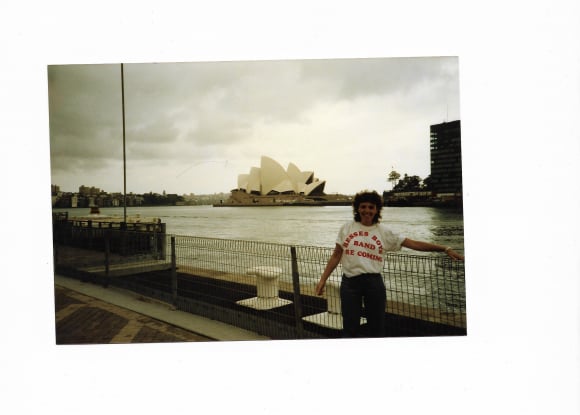

Whilst being a highlight in the band’s history, the visit to Australia had far reaching effects that would change the band dramatically, the older players who had worked hard for, and committed themselves to the tour were permitted to stay on over the age when the would normally have moved on to adult bands.
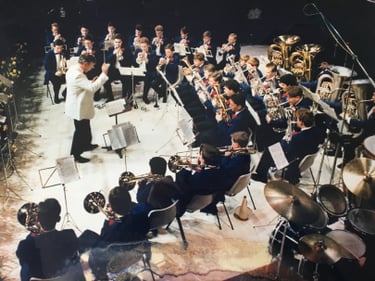

This unfortunately held up the progression of some of the ‘training band’ members into the ‘Boys’ Band’ and resulted in them leaving, and it was decided for the band to maintain its existence it would be a good move to allow ladies to join the band.An EGM (Extraordinary General Meeting) was held and on the 3rd November 1989 and the decision was formerly agreed. Secretary Irene Grady was instrumental in this decision and her admission to the committee was the first step in girls joining the band
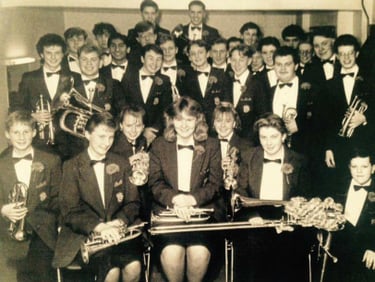

1990
The 1991 Christmas concert was the last to be conducted by Barrie Chappell. Soon after, Steven Sharples, was appointed conductor in 1992 and conducted the band for several royal occasions. The band had the honour to play for Her Majesty Queen Elizabeth II in Bury at the opening of Bury Metrolink and again for Princess Anne at the opening of the Manchester G-Mex exhibition centre and lastly at a Dinner for Prince Edward.
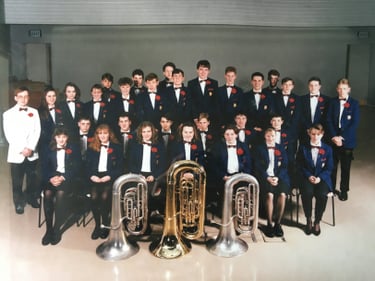

A trip to Scotland and a concert in Dornoch Cathedral were arranged with help from John Whittaker an "old boy" from Heywood. Steven Sharples also led the band which won the right to represent the North West in the reorganized National youth championship final in 1993.Ex-Chairman Alan Bryan gave strong leadership for several years and the loyalty of Fred Snape, son of founding member Nat, cannot be matched. Fred was appointed president in appreciation of his many years as secretary, treasurer and chairman. Arnold Duxbury was the spearhead of the new move to the new bandroom at Clarkes Hill in Prestwich and is just one from dozens of people who have worked for the band
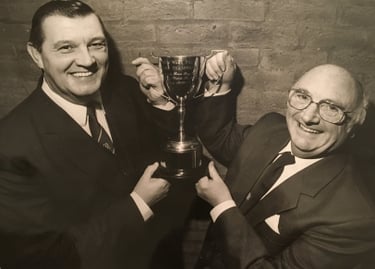

In 1999 the band were lucky enough to receive a lottery grant from the North West Arts Board. After several unsuccessful applications for Lottery funding a shake-up in the way cash was distributed by the regional art board in April meant that the boys’ band met the criteria for funding. An early Christmas present was received by the band to the sum of £45,755 which allowed for new brass and percussion instruments to be purchased for the main band, and instruments being made available for the ever expanding training and beginner’s bands securing the future of the Besses Boys’ into the new millennium.Colin Duxbury and Andrew Keegan
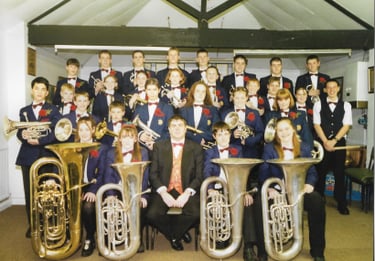

2000
During the Naughties the band was declared the North West Region Fourth Section Champions. The experienced gained with the band was invaluable to the players of the time with a number of them playing for senior bands such as Fodens, Brighouse and Rastrick and Yorkshire Building Society Bands. In 2000 the band performed a joint concert with Wingates Brass Band conducted by John Powell - Besses Boys’ Band conductor and well-known member of tubulate, a brass ensemble of professional euphonium and tuba players. Old Boy Chris Wormold was awarded the Mortimer Medal by the Worshipful Company of Musicians for services to youth band music and in 2001 Besses Boys’ completed a double that no other band has equalized when Old Boy Colin Duxbury was similarly awarded the Mortimer Medal.
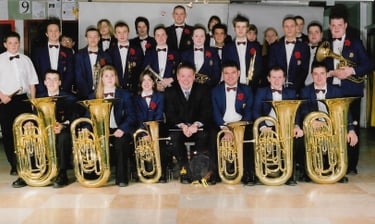

2001 saw the band tour Germany after winning Best Youth Band and Best Youth Cornet for the second successive year at the Whit Friday Brass Band Marches in Denton. A five day tour to Mosselle Valley was arrange by Club Europe Concert Tours that was the first time abroad for many band members, and the first with conductor John Powell. The tour saw the band play on the largest bandstand in Europe, in Luxembourg, and then perform in towns around Trier and Mosselle.
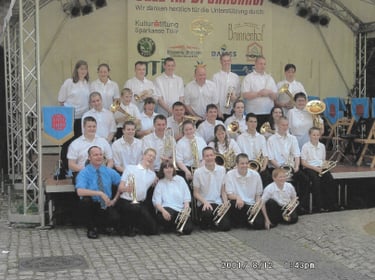

The bands concert and contest work continued with Carl Whiteoak taking over the batten in 2002 and in 2003 the band saw a new conductor take centre stage. Matt Stringer a euphonium player who had played in numerous bands throughout the North West, joined Besses Boys’ Band in 1986 enjoying mush success and took part in the tour of Australia in 1988. Matt conducted the band at the 60th Anniversary concert on the 11th October 2003 and celebrated yet another milestone in the illustrious history of Besses Boys’ Band along with guest conductor Dr Roy Newsome. A life member and famous throughout the world for his work with Brass Bands, Roy had been associated with “Besses” for a number of years being Musical Director of Besses o’th’ Barn Band in the late seventies and a huge influence on Besses Boys’ Band for over a decade.Matt had mixed success with the band during his two year tenure, venturing out of the top 3 prize spots on only 3 occasions.
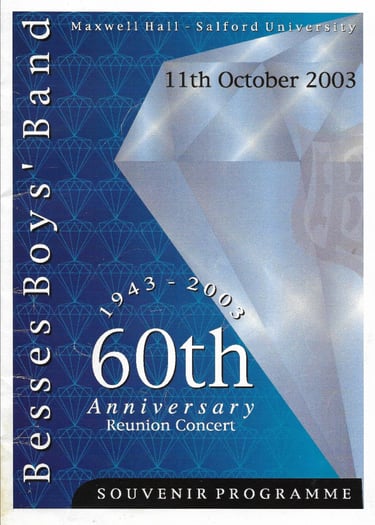

The North West Area Regional Championship contest in March that year had no less than 7 Old Boys conducting bands at the competition. Kevin Donaldson, Colin Duxbury, Gordon Higginbottom, Nigel Martin, Andrew Warriner and Chris Wormold with Besses Boys’ playing Simon Dobson’s ‘Lydian Pictures’ under the baton of Matt Stringer.
John North conducted the band in 2003 and James Holt a Solo Baritone player who joined the band in 2002 was appointed to the Musical Director position with Besses Boys in January 2005. James studied Music at the University of Salford and it was here that he was given the opportunity to work with some of the banding world's most prominent personalities such as Roy Newsome, David King and Peter Graham as well as receiving tuition from Peter Christian and Billy Millar.
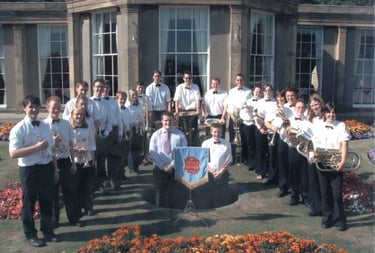

Besses rejoined forces in September 2005 for a joint concert with the senior Besses o’th’ Barn Band for the first time in several years. The bands grew apart, forming separate bands with their own support groups although maintaining a connection and sharing the stage at the Peel Hall in Salford for a concert, entitled Besses United. The bands played their own programmes and came together for a massed finale conducted by James and senior band guest conductor, Derek Broadbent.
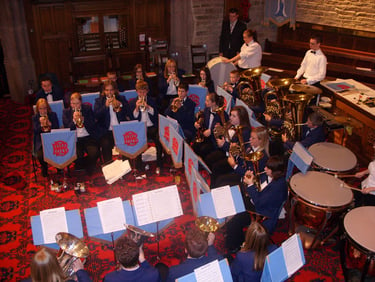

James Holt brought about the band’s first win in a decade at the Buxton Brass Band Festival in April 2006 playing ‘Variations on Laudate Dominum’ and the band went from strength to strength in the late 2000’s winning the fourth section at the Tameside Open Championship in 2007 and Fleetwood Brass Band contest in 2008.As well as much contest work the Boys’ continued to support the community and entertain locally during these times. The band performed several concerts at Radcliffe Civic Suite including a concert in aid of Bury Hospice in 2008 and a joint concert with popular folk group, the Houghton Weavers.
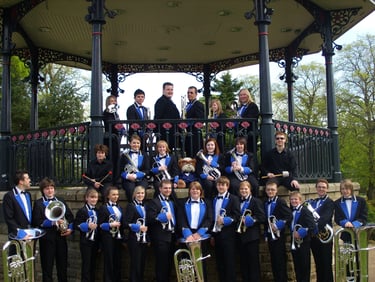

2010
The early twenty-tens are some of the most successful years in Besses Boys’ Band history. The band made considerable progress culminating in many contest successes, including successive regional titles and three consecutive national final appearances meaning that for the first time in their history the band now competes in the 2nd sectionAfter mixed success on the contest stage the band found themselves never to be placed outside the top 6 prize placings at 15 contests from March 2009 to February 2011.On the 14th March 2010 the band travelled to the Winter Gardens in Blackpool to compete in the North West Area Regional Brass Band Championships. The Boys’ played Phillip Sparke’s, Saint-Saëns Variation and were awarded the 2nd place prize trophy along with an invitation to the National Brass Band Championship of Great Britain in Harrogate for September of that year. The band formed a remarkable run of success and little did they know that this would be the first of three successive national finals the band would see in coming years.
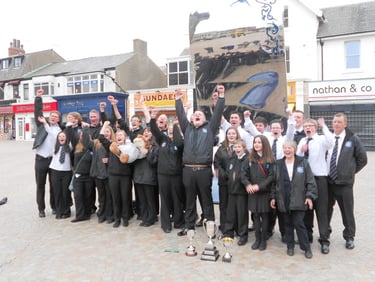

Besses Boys’ Band were awarded 2nd place at the National Brass Band Championship of Great Britain playing ‘A Royal Mile Suite’ and climbed the ranks into the third section locally. The band then went on to be crowned third section champions at the Brass at the guild Preston contest in early February 2011 and deservingly won the Fourth section North West Area Regional Brass Band Championship in late February which followed the bands second invitation to the Brass Band Championship of Great Britain.
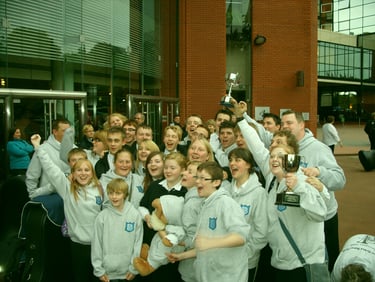

The winning didn’t stop there, In November 2011 the band won their last contest as a Fourth Section Band at the Northern Open playing Peter Grahams ‘Northern Landscapes’ before having the official title of a Third Section band at local and national levels. The band seemed unstoppable and no less than 12 months into the Third Section the band returned to Blackpool for the North West Area Regional Brass Band Championship in early 2012 and won, meaning they would return to Cheltenham to compete in the National Brass Band Championship of Great Britain for the third time in a row later that year.The band climbed the ranks again and for the first time in their history competed at second section national level. This was a huge achievement for the band and saw them go from a Fourth Section to a Second Section Band in just two years.
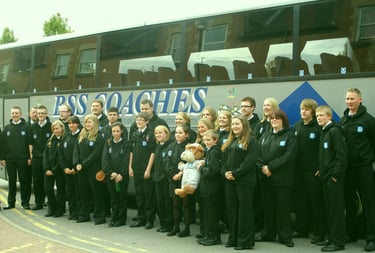

Buoyed by their success, the players went on tour Germany and Cornwall and the warm reception and rave reviews they received inspired the band to branch out to bring about more tours and concerts in future.The band organized appearances in St James's Park in London as well as at venues in Penrith and St Austell, Lincoln, York, Scarborough and Durham. Contest work also continued and in October 2015 travelled the short distance from their Simister rehearsal room to Rochdale Town Hall to compete in the North West Brass Band Association competition. They went head to head against nine other North West bands in the second section under the baton of long-serving musical director James Holt and were pleased to receive first place, highest place NWABBA member and best instrumentalist award for Solo cornet.
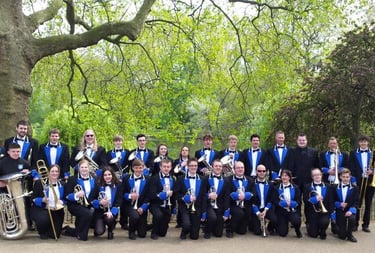

Since 2010, the band were placed in the top three in no less than 19 of the 26 contests and have moved up in the national grading from the fourth to the second section.Following the band’s first prize at the Rochdale Contest in November the band travelled to Skegness in January 2016 for their debut at the Butlins Mineworker Brass Band Championship.Competing in the second section, Besses Boy’ Band gave a performance of 'Fire in the Blood' by Paul Lovett Cooper, winning first prize and the victory wall all the more impressive as the standard of the contest was very high, with 24 bands competing from across the country.
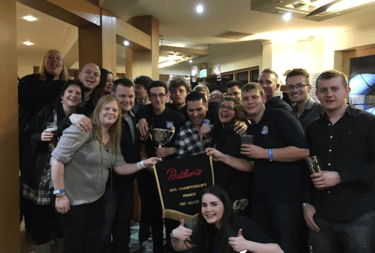

In summer 2017 the band visited Belgium, Germany, Luxembourg and the Netherlands on a self-funded five-day European tour. The band performed three concerts, including one at Drielandenpunt; the point at which Belgium, Germany and the Netherlands meet. The concert programme comprised a mix of traditional standards, solo items and music from stage and screen, all of which were well received by appreciative audiences. The tour itinerary interspersed concerts with opportunities to spend time exploring the cultural and social heritage of the local area, including a visit to Cologne Cathedral and boat trip along the Rhine. The European tour was a great opportunity for the band and their music was well received by all. A representative of Luxembourg City Council made a presentation to MD James Holt, thanking him for entertaining the people of Luxembourg with wonderful music' during the visit.
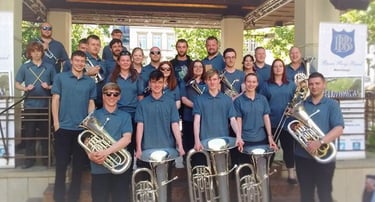

Recent successes involve being crowned Whit Friday 2018 Second Section Champions at Carrbrook, 2nd section prize award winners at the Blackburn and Darwen March and Hymn tune contest and a joint concert with the championship band of Great Britain, Brighouse and Rastrick.Besses Boys' Band are understandably proud of our history and traditions and want to share their thanks and appreciation to all members, past, present and future.
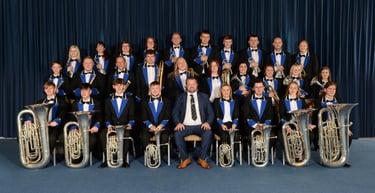

Besses Boys Band is possibly the country's best-known junior band. It claims to be the country's oldest-surviving youth band, having been established in 1943 primarily as a "feeder" band for the renowned Besses o'th' Barn Band many of whose players were, at that time, away serving in the forces. But for more than 30 years, Besses Boys Band has operated completely independently of the senior band.
The renowned band has held the North West Area championship title for a record 11 times and is the only band to have represented England at every European Youth championship since the inauguration in 1988
